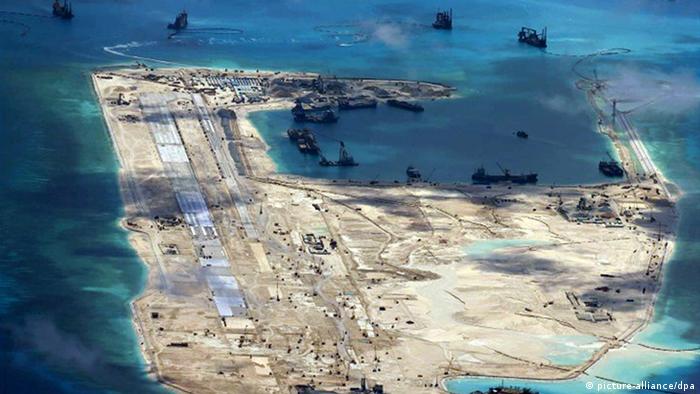Water Wars: Known Unknowns in the South China Sea
Scholars and Officials Debate: Was This Week's FONOP a FLOP?

Construction on Fiery Cross Reef (Photo: Duetsche Welle)
Published by The Lawfare Institute
in Cooperation With

Scholars and Officials Debate: Was This Week's FONOP a FLOP?

Construction on Fiery Cross Reef (Photo: Duetsche Welle)
The USS William Lawrence conducted a Freedom of Navigation Operation (FONOP) within 12 nautical miles of Fiery Cross Reef on Tuesday, May 10th. Chinese-controlled Fiery Cross Reef is home to a 10,000-foot runway and substantial military and civilian infrastructure. Last month, Chinese military aircraft landed at Fiery Cross Reef and General Fan Chanlong, vice-chairman of the Chinese Central Military Commission, visited the reef’s facilities. China responded to this week’s FONOP by scrambling two fighter jets and directing three warships to tail the USS Lawrence. This is the third FONOP conducted by the US Navy in the South China Sea since consistent exercises began in 2015.
Chinese officials were quick to condemn the US and promised strong countermeasures. PLA Spokesperson Col. Yang Yujun called the “unauthorized illegal entry into Chinese waters near China’s Nansha (Spratly) island by the U.S. warships and warplanes . . . . a serious provocation.” Foreign Ministry Spokesperson Lu Kang also condemned the US for “waving the banner of navigation and overflight freedom and flexing its muscles in the South China Sea.” A day later, the Ministry of National Defense responded by announcing increased maritime and air patrols as well as construction of “various defense capabilities” in the South China Sea. Taiwan, on the other hand, struck a more conciliatory note. The Ministry of Foreign Affairs said that it was “paying close attention” to the situation and reiterated Taiwan’s “rights to these island groups and their surrounding waters.”
Notwithstanding these reactions, a number of analysts both inside and outside China questioned whether the USS Lawrence’s sailby had much legal bite. The Department of Defense stated that this FONOP challenged claims by China, Taiwan, and Vietnam “to require prior permission or notification of transits through the territorial sea” by military vessels “exercis[ing] the right of innocent passage.” Innocent passage is understood as the right of all vessels to pass through a territorial sea (constructed around any rock or island) as long as the vessel does not perform military or intelligence-gathering activities. Euan Graham at The Interpreter called this the “least assertive form of surface FONOP” and Julian Ku at Lawfare argued that the US should seriously consider “non-innocent passage” operations that would “directly challenge[] the legitimacy of China’s artificial islands.” An editorial from The Global Times, a Chinese publication, was similarly bullish about China’s strategic position despite this most recent FONOP.
In other news...
The Philippines
Rodrigo Duterte is the unofficial winner of the Philippines’ presidential election, sending shock waves through the region’s foreign policy community. In the run-up to the election, Duterte blamed current President Aquino for China’s ongoing reclamation in the South China Sea and was open to the possibility of bilateral negotiations and resource sharing with China. That said, Duterte also called for multilateral negotiations that would include all claimant nations, the United States, Japan, and Australia.
Chinese officials have matched Duterte’s wide-ranging comments with equally varied statements. Foreign Ministry Spokesperson Lu Kang hoped that “the future for relations between China and the Philippines can be brighter” while nonetheless reiterating China’s preference for bilateral negotiations. An editorial from Xinhua also urged the new Philippine president to reject “hawkish politicians in Washington and right-wing extremists in Tokyo.”
China
China spent most of the week on the defensive. It began with Ambassador to the UK Liu Xiaoming criticizing Senator McCain’s editorial in The Financial Times, claiming that the US has led militarization in the South China Sea. Director-General Xu Hong from the Foreign Ministry reiterated the grounds for China’s criticism of the ad-hoc Philippines/China tribunal and Director-General Ouyang Yujing warned that criticism of China could well rebound like a “coiled spring.”
China also dealt with a series of unexpected collisions in the East China Sea. Two Chinese fishermen were killed and another 17 went missing after a Chinese fishing boat collided with a Maltese freighter. Twenty crewmembers from the Maltese ship were detained for investigation in the eastern Chinese city of Ningbo. It is unclear where in the East China Sea this incident occurred. A Chinese container vessel also collided with a Liberian boat late last week; all 22 crewmembers were rescued.
Japan
Finishing up last week’s trip through Southeast Asia, Foreign Minister Kishida met with Laotian Prime Minister Thongloun Sisoulith to discuss disputes in the South China Sea. Prime Minister Thongloun reportedly agreed to make efforts to resolve the issue and is expected to visit Japan for a G-7 outreach session in late May. The China Daily was quick to condemn this charm offensive, claiming that Japan “is both fueling and exploiting tensions in the disputed waters to advance its own economic and strategic interests in Southeast Asia.”
Three Chinese Coast Guard vessels entered territorial waters around the Senkaku/Diaoyu Islands on Monday, the twelfth time they have done so this year. It is perhaps unsurprising, then, that Japan continued to upgrade its military capacity in the southern island chain. Despite continued antagonism, however, Japanese sources reported that ministerial-level economic meetings may restart this summer for the first time since August 2010.
Taiwan
The Chinese (Taiwan) Society of International Law, a government-linked group, submitted several hundred pages of evidence that was accepted by the ad-hoc tribunal responsible for the Philippines’ case against Chinese claims in the South China Sea. The Society’s submission states that, “it is clear that Taiping Island (Itu Aba) is an island which can sustain human habitation and economic life of its own under . . . UNCLOS.” A spokesperson for President Ma Ying-jeou clarified that the submission was not made on behalf of the Taiwanese government, but that it was consistent with its official stance.
Taipei’s dispute with Tokyo over the seizure of a Taiwanese fishing vessel near a disputed atoll came to a head last Friday as Japan responded to Taiwan’s deployment of two coast guard vessels with five ships of its own. Taiwan’s Ministry of Foreign Affairs has called on the Coast Guard to avoid escalating the issue and President-elect Tsai Ing-wen met with Prime Minister Shinzo Abe’s brother to talk about the situation.
Malaysia
Prime Minister Najib Razak’s ruling coalition captured 72 of 82 seats in Malaysia’s largest state in the first election after a scandal involving a government-backed investment fund rocked the country. Bridget Welsh at New Mandala explains why this result is not surprising.
Days later, Foreign Minister Datuk Seri Anifah Aman announced that he and Chinese State Councilor Yang Jiechi agreed to settle South Chin Sea-related disputes through ASEAN’s Declaration on the Conduct of Parties in the South China Sea and intensify negotiations around the much-awaited Code of Conduct in the South China Sea. Minister Anifah also said that Councilor Yang promised to “look into” last month’s incursion of Malaysian waters by 100 Chinese fishing vessels.
Vietnam
The Obama administration is deliberating over Hanoi’s request to completely repeal a lethal weapons embargo that was partially lifted in 2014. Though reports indicate that defense officials are largely in favor of lifting the embargo, begun after the Vietnam War, Assistant Secretary of State Daniel Russel noted that, “one of the important factors that would make a lift of the ban possible would be to continue forward momentum in meeting universal human rights standards.” A decision, which may be forthcoming during President Obama’s upcoming Asia trip, will reportedly hinge in part on ongoing talks with Hanoi led by Assistant Secretary of State for Democracy, Human Rights, and Labor Tom Malinowski.
Singapore
Singapore will expand two military bases in Australia and send an additional 14,000 troops per year as part of a $1.7 billion deal with Canberra to expand defense cooperation. This deal will more than double Singapore’s current deployment to Australia. The two countries also plan to enhance military personnel exchanges, start civilian personnel exchanges, and deepen intelligence and information sharing.
Indonesia
Jakarta and Beijing committed to improving trade after a meeting on Monday between President Widodo and State Councilor Yang Jiechi. The agreement to improve bilateral relations in all fields is notable given the fallout after China’s Coast Guard interrupted Indonesian authorities arresting a Chinese fishing vessel off the coast of Natuna Island. In unrelated news, Defense Minister Ryamizard Ryacudu announced plans to purchase an unspecified number of Airbus A400M military transport aircraft.
Analysis, Commentary, and Additional Information
The rise of President-elect Duterte of the Philippines consumed much of the scholarly world’s attention this week. East Asia Forum dedicated three articles to examining motivations for his election. Julio Teehankee and Mark Thompson highlight pent-up anger in the middle class, Ronnie Holmes underscores the importance of personality politics, and Imelda Deinla focuses on the rule of law deficit. Pivoting to the international scene, Emily Rauhala in The Washington Post provides an overview of Duterte’s mixed messaging regarding the Philippines’ relationship with China. Jesse Johnson at The Japan Times and Matthew Pennington at Stars and Stripes outline how President Duterte may upend relationships with Tokyo and Washington. Lindsay Murdoch at The Sydney Morning Herald reflects much the same concern for Canberra.
Brookings released a much-read paper by Paul Gewirtz that provides an overview of the Philippines/China arbitration and highlights the likely limits of a decision from the ad-hoc tribunal. Mindful of these limitations, there were a number of articles this week recommending how states should strategize going forward. Zack Cooper and Bonnie Glasser at The National Interest begin with the US, parsing the Obama administration’s decision to undertake yet another innocent passage FONOP. Tom Switzer at The Strategist examines how Australia should proceed after the Lawrence’s FONOP and Abhijit Singh explains why Beijing is unlikely to change its strategy in the near future. Marvin Ott and Mick Zloof at The Diplomat round out the analysis by looking at Indonesia’s strategic options after the Natuna incident.
Buavanh Vilavong at East Asia Forum looks ahead to Laos’ turn as ASEAN chair and Liu Zhen and Teddy Ng at the South China Morning Post explore why ASEAN should start negotiations on a coastguard vessel code of conduct. China, as always, is the elephant in the room. Loke Hoe Yeong at ASEAN Today provides an overview of the dispute while Philip Bowring at The Globalist argues that China has effectively neutralized ASEAN on the South China Sea.
And finally, we move to Taiwan. Jiye Kim at East Asia Forum summarizes Taipei’s stance on South China Sea disputes while Tsai Chi-ting at AMTI questions this traditional interpretation of Taiwan’s position regarding the nine-dash-line. Stratfor also released a report on the unintended consequences of Taiwan’s dispute with Japan regarding Okinotori atoll.
Water Wars is our weekly roundup of the latest news, analysis, and opinions related to ongoing tensions in the South and East China Seas. Please feel free to email Chris Mirasola with breaking news or relevant documents.





